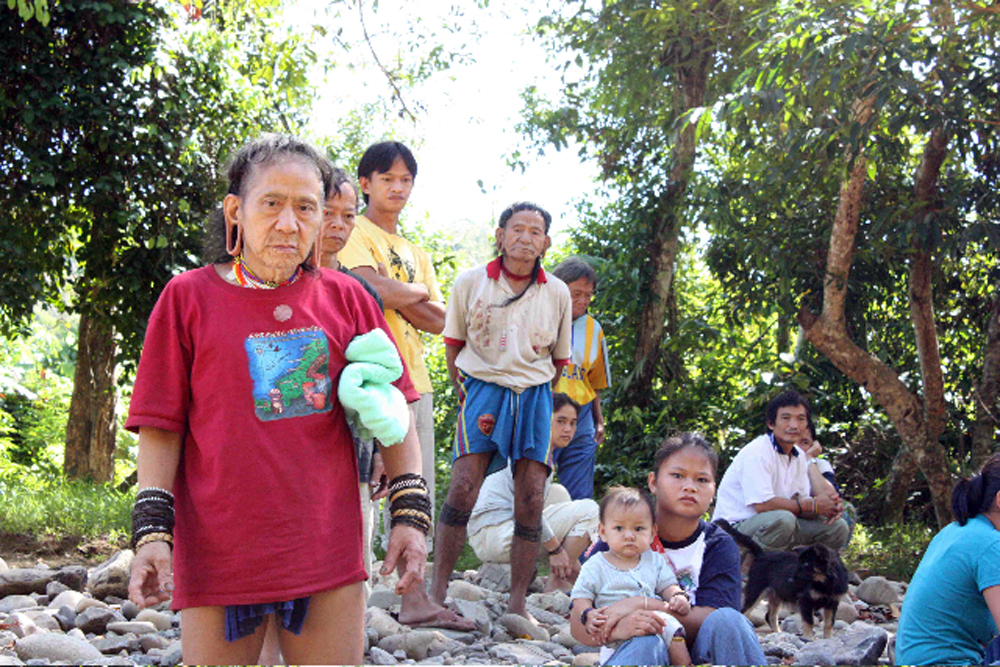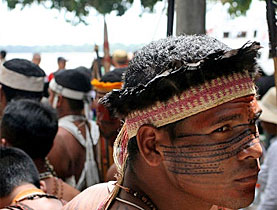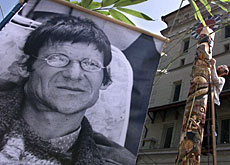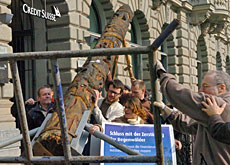20 years on, NGO vows to fight corruption

After two decades of environmental campaigning for Malaysia’s Penan tribe, the Bruno Manser Fund (BMF) is stepping up its fight against local political corruption.
BMF remains one of the few non-Malaysian organisations still campaigning on behalf of the Penan, an indigenous people living in some of the world’s most biodiverse forests in Sarawak on the island of Borneo.
Two-thirds of its forests have been destroyed in recent years for logging or to build palm oil plantations. Now the BMF is targeting the political powers behind these developments.
The Basel-based BMF has spent the past 11 years carrying on the fight launched by its charismatic founder Bruno Manser, a Swiss activist who lived among the Penan for six years and introduced peaceful road blocks in a bid to stop logging.
He set up the BMF on December 7, 1990, but disappeared on a trip back to Sarawak in 2000. A Basel court declared him missing and presumed dead in 2005.
The BMF says it has been making progress in the past 20 years despite most of the primeval forests being cut down.
“We have been successful in Sarawak in keeping the campaign going, keeping resistance against logging going, in terms of helping the local indigenous communities to get organised and to empower them to do the right things themselves, and to know also that they have rights to their land, that they have a right to have a say about their livelihood,” BMF director Lukas Straumann told swissinfo.ch.
As well as land mapping and setting up a pre-school and healthcare facilities, BMF have also helped the Penan take several land right cases to local courts and raised awareness of the situation elsewhere in Europe.
But faced with Sarawak’s “dictatorship-like rule”, it hasn’t been enough to make a significant change, the organisation says.
“Kleptocratic” rule
“Our biggest concern today is that the same government is still in place in Sarawak, as it has been for the past three decades, and the same family rules that state of Malaysia and it’s a kleptocratic form of governance,” Straumann said.
The family in question is that of Chief Minister Abdul Taib Mahmud, who Straumann says controls politics, the economy and the media. Taib is also the minister in charge of finance and planning.
The BMF website regularly reports on allegations of corruption in Sarawak. In February it launched an online campaign against Taib and 48 “blacklisted” companies, and this week the campaign stepped up a notch when BMF published a list of 332 companies in Malaysia with ties to Taib’s relatives, many of whom are directors or shareholders. Another 101 such companies are located elsewhere in the world.
BMF gathered the information from company records and registers and tried to find patterns. Dissecting the data further they found that Taib’s four children were involved in 342 firms worldwide.
“It’s really unbelievable. They are basically controlling the whole state,” Straumann said.
The BMF also alleges that the Taib family is hiding assets abroad. Probes into alleged illegally gained assets are being carried out in Switzerland and Britain.
Rooting out corruption
Straumann said the time had come to widen their approach.
“We think corruption is one of the main drivers of environmental destruction in Borneo and I think it is also true in other countries. So I think it’s really important for us as an environmental and human rights group to see the broader picture,” he said.
“In a way after having run campaigns for 20 years we had to ask ourselves why these campaigns at a local level are not successful. The Malaysian government and Sarawak government in particular have not given in at all. And then we found out it’s all about corruption.”
Taib has denied taking any kickbacks or hiding assets abroad. He maintains deforestation is being done in the name of much needed development.
Straumann said Bruno Manser himself had tried to take on Taib but became depressed when he realised Taib was too powerful.
Role of NGOs
As well as its anti-corruption campaign, over the next year the BMF will also be looking closely at 12 dam projects in Sarawak which it says would flood villages and be “devastating” to the Penans’ livelihood.
In 2010, at the ten-year commemoration of Manser’s disappearance, forestry campaigner Saskia Ozinga bemoaned the lack of organisations supporting the Penan people – a cause that attracted a lot of attention in the 1980s and 1990s but which had waned due to Malaysian NGO disunity and possibly a wrong focus by European NGO on timber instead of human rights.
Ozinga, a founder of the NGO Fern, told swissinfo.ch: “As the problems in Sarawak are caused by incompetent or corrupt government, I think it is wise of BMF to focus on the corruption charges.”
The Swiss branch of the Society for Threatened People says organisations like the BMF are “extremely important” to indigenous people who are often marginalised or ignored.
“Without Bruno Manser, I am quite sure, nobody would know about the destiny of the Penan people,” branch director Christoph Wiedmer told swissinfo.ch.
He added: “It is very important that support is done in a positive way that does not risk becoming contrary to the interest of the indigenous peoples.”
BMF and other organisations have a role to play in raising issues at the United Nations level, putting pressure on governments and companies, helping with legal defence and in carrying out socio-economic projects on the ground, Wiedmer said.
The Penan are one of 24 tribes in Sarawak, Malaysia’s biggest state, located on the island of Borneo. Around 50 years ago an estimated 100,000 Penan were nomadic or semi-nomadic, hunting and gathering food in the forest. Now only around 200 people still live this way.
Logging is seen as the biggest threat to the Penan way of life. It also leads to contaminated drinking water and soil erosion.
Less than 10% of Sarawak’s original primeval forests are intact, according to the Bruno Manser Fund. The Penan and other indigenous groups are still waiting for the recognition of their rights to the land in the forest areas that they have traditionally inhabited.
Bruno Manser was a long-time campaigner for the Penan, with whom he lived between 1984 and 1990.
At the age of 30 he went looking for a society that was still living close to nature – something he saw in the Penan. Manser went to live with them.
He encouraged the Penan to resist loggers by means of peaceful road blockades. In 1990 he returned to Switzerland and set up the Bruno Manser Fund to publicise the Penan cause.
Manser published a book, “Voices from the rainforest”, gave lectures and carried out a series of protest actions. In 1993 he went on a 60-day hunger strike in front of the Swiss parliament building in the hope of obtaining an import ban on tropical timber.
In 1999 he landed in the home of Sarawak Chief Minister Abdul Taid Mahmud using a hang glider.
Manser disappeared on a return visit to Sarawak in 2000. The last known trace of him was on May 25, 2000, in the Borneo rainforest. Search parties failed to find him. A Basel civil court officially declared him missing and presumed dead in 2005.
The Basel-based Bruno Manser Fund campaigns for threatened tropical rainforests and the rights of their inhabitants.
It focuses its activities on the Penan people of Sarawak in particular and has projects in Malaysia and projects and campaigns in Europe.
It is financed by donations from private individuals, foundations and selected businesses. Individual projects also receive support from communal and cantonal funds.

In compliance with the JTI standards
More: SWI swissinfo.ch certified by the Journalism Trust Initiative













You can find an overview of ongoing debates with our journalists here . Please join us!
If you want to start a conversation about a topic raised in this article or want to report factual errors, email us at english@swissinfo.ch.